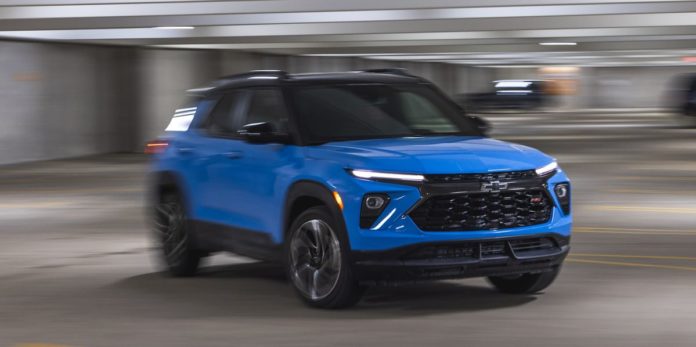It’s embarrassing to be upstaged by a little sibling. Just ask the Chevrolet Trailblazer, a subcompact SUV that’s been around since 2021. The underachieving Trax sitting next to it in the showroom never really gave the Trailblazer cause for concern, until the redesigned 2024 Trax showed up with a whole new outlook on life. The new Trax promises more space, appealing style, and new features—all for significantly less money—and we just awarded it a 10Best Trucks and SUVs trophy. It is already encroaching on the Trailblazer’s sales numbers, too, outselling it in the third quarter of 2023.
The Trailblazer is doing its best to stay relevant, and a refresh for the 2024 model year brings bigger screens inside, freshened looks, and new colors. But the Trailblazer is facing an uphill battle against its significantly cheaper stablemate—and against other vehicles in this competitive segment.
One might wonder why Chevrolet bothers to sell both the Trax and the Trailblazer. These two models are an example of a split that’s evident within the subcompact-crossover segment. The Trax is meant to compete with the smaller, front-wheel-drive-only pseudo-hatchbacks that exist on the lower end of the price spectrum—think Kia Soul, Hyundai Venue, and Nissan Kicks—while the taller Trailblazer is meant to be a “real” SUV (in that it offers optional all-wheel drive, at least) that costs a bit more and has a more upright shape.
It’s not entirely an illusion, either, as the Trailblazer has a higher seating position than the Trax by more than two inches, according to our measurements. And, if you select all-wheel drive, the Trailblazer does offer a more compelling optional powertrain, a 155-hp 1.3-liter turbocharged three-cylinder with a nine-speed automatic transmission (as opposed to a CVT in other Trailblazers and a six-speed automatic in the Trax). There is a bit more refinement to be found in the Trailblazer, too, as its heavier curb weight creates more of a planted feeling on the road. We like the way the Trailblazer steers, and its brake pedal exhibits good feel, bringing the SUV to a rest from 70 mph in just 166 feet.
But when you look more closely at the numbers, paying more for the Trailblazer starts to make less and less sense. The Trax’s longer wheelbase means it offers slightly more passenger room, and it even has a bit more cargo room with the seats folded, swallowing 21 carry-on suitcases in our testing compared with the Trailblazer’s 19. Plus, the Trax’s 1.2-liter engine is barely at a disadvantage next to the heavier Trailblazer’s 1.3-liter. The Trax gets to 60 mph just 0.1 second slower and had a slightly better performance in our real-world 75-mph highway fuel-economy test (30 mpg, versus 29 mpg for the Trailblazer).
The price difference is what really makes the fight seem unfair. The Trax’s base price sits at just $21,495, while a comparable Trailblazer is nearly $3000 dearer. The disparity grows when you start piling on options, as our loaded Trailblazer RS AWD—admittedly thick with desirable extras such as a panoramic sunroof and a power liftgate, neither of which the Trax offers—stickered for $34,470. A loaded Trax, on the other hand, barely crests $27,000.
If you’re merely looking to spend as little money as you can on a satisfying crossover-esque small car, the high-value Trax is a no-brainer. But if you’re willing to shell out more for things like all-wheel drive and interior niceties, several more attractive options exist within the Trailblazer’s price range, including the Mazda CX-30 and the Kia Seltos. That leaves the Trailblazer stuck in an awkward liminal space, with little to recommend it unless you manage to snag an attractive discount.
Specifications
Specifications
2024 Chevrolet Trailblazer RS AWD
Vehicle Type: front-engine, all-wheel-drive, 5-passenger, 4-door wagon
PRICE
Base/As Tested: $29,995/$34,470
Options: power panoramic sunroof, $1495; Convenience package (automatic climate control, rear type-A and -C USB ports, wireless device charging, 120-volt outlet, auto-dimming interior mirror, driver and passenger illuminated vanity mirrors, power liftgate), $1195; Adaptive Cruise and Sound package (7-speaker Bose sound system, adaptive cruise control), $995; Fountain Blue paint, $395; Driver Confidence package (blind-spot monitoring, rear-cross-traffic alert, rear park assist), $395
ENGINE
turbocharged and intercooled DOHC 12-valve inline-3, aluminum block and head, direct fuel injection
Displacement: 82 in3, 1338 cm3
Power: 155 hp @ 5600 rpm
Torque: 174 lb-ft @ 1600 rpm
TRANSMISSION
9-speed automatic
CHASSIS
Suspension, F/R: struts/torsion beam
Brakes, F/R: 11.8-in vented disc/10.4-in disc
Tires: Continental ProContact TX
245/45R-19 98H M+S TPC Spec 3178
DIMENSIONS
Wheelbase: 103.9 in
Length: 173.5 in
Width: 71.2 in
Height: 65.7 in
Passenger Volume, F/R: 50/45 ft3
Cargo Volume, behind F/R: 54/25 ft3
Curb Weight: 3390 lb
C/D TEST RESULTS
60 mph: 8.7 sec
1/4-Mile: 16.7 sec @ 83 mph
100 mph: 28.0 sec
Results above omit 1-ft rollout of 0.3 sec.
Rolling Start, 5–60 mph: 9.5 sec
Top Gear, 30–50 mph: 4.5 sec
Top Gear, 50–70 mph: 6.5 sec
Top Speed (C/D est): 130 mph
Braking, 70–0 mph: 166 ft
C/D FUEL ECONOMY
Observed: 23 mpg
75-mph Highway Driving: 29 mpg
75-mph Highway Range: 380 mi
EPA FUEL ECONOMY
Combined/City/Highway: 27/26/29 mpg
C/D TESTING EXPLAINED
Despite being raised on a steady diet of base-model Hondas and Toyotas—or perhaps because of it—Joey Capparella nonetheless cultivated an obsession for the automotive industry throughout his childhood in Nashville, Tennessee. He found a way to write about cars for the school newspaper during his college years at Rice University, which eventually led him to move to Ann Arbor, Michigan, for his first professional auto-writing gig at Automobile Magazine. He has been part of the Car and Driver team since 2016 and now lives in New York City.

